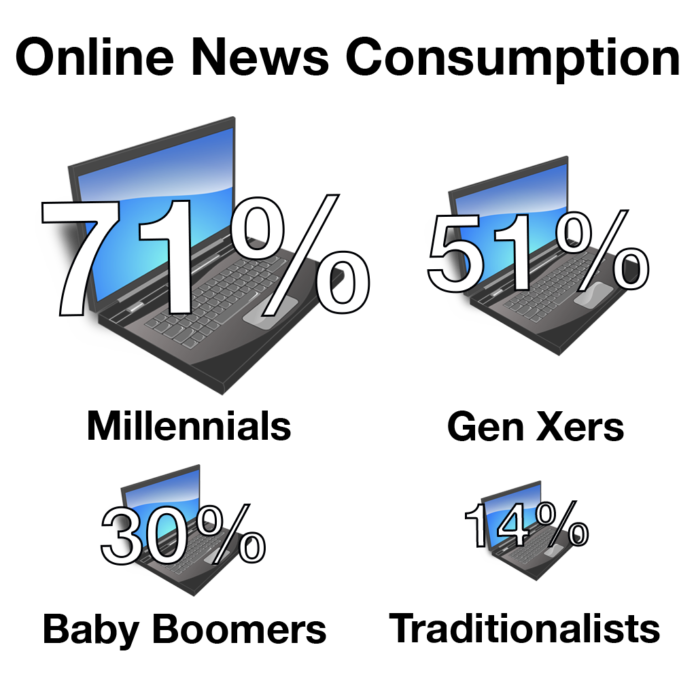By Rylee Seavers | Staff Writer
As millennials have become the nation’s largest generation, making up a majority of the workforce, business professionals weigh in on working with a younger generation.
In May 2015, millennials in the U.S. labor force numbered 53.5 million, making millennials the largest working generation, according to the Pew Research Center. Nearly a year later, in April 2016, millennials became the largest living generation in the United States, according to the Pew Research Center.
Millennials are “first generation digital natives,” according to the “How Millennials Want to Work and Live” report by Gallup. Seventy-one percent of millennials use the internet as their main source of information, according to the report. Generation X is close behind, with 51 percent using the internet as their main source of information, but baby boomers and traditionalists (born between 1922-1943) use the internet for information significantly less, according to the report.
Facts like these change the way people function in the workforce. Gallup reported that millennials are looking for bosses who behave more like coaches, appreciating the skills that millennials bring to a business and encouraging them to build their strengths. Millennials also look for constant communication in the workplace, according to the report. They want instant feedback about their work, rather than a review once a year. Both are departures from traditional business models, which can cause prior generations to struggle when dealing with millennials.
“Millennials are very creative individuals. They want flexibility. They really value the work-life balance, and those are things that employers are trying to figure out how to balance. [Employers] are in the business of being in business and have to meet the obligations of whatever their operations are,” said Kris Collins, senior vice president of economic development for the Greater Waco Chamber of Commerce.
The study also found that 60 percent of millennials are open to the idea of changing jobs, which is 15 points higher than any other generation. Fifty-five percent of millennials are disengaged from the workforce, meaning that they are not passionate about the work they are doing or their companies are not giving them a reason to stay, the study found.
“The pendulum is swinging in the direction of growing your career, and that might not be with the exact same employer the entire time, but there is room for growth,” said Julie Copenhaver, assistant director of communications for career and professional development.
Copenhaver said that millennials’ “job jumping” could be a result of dissatisfaction with a company or lack internal growth, but staying in a job for a year is a good rule.
“[Millennials] are always wanting a challenge and they are wanting opportunities for growth,” Copenhaver said. “That can be perceived negatively, but that’s also the challenge, for the employer-to really rise to that occasion and realize that.. Millennials are not going away. Millennials are going to be our bosses and everyone’s bosses soon enough.”
Gallup reported that many millennials view their job as their life and have a strong desire to find a good job. Millennials are asking themselves if their work is being valued in their current positions, and if it is not, they will change jobs until they find one where it is, the report said.
“Employers are looking for individuals that really want to be a part of the value proposition of the business. If a business could do a better job of really expressing what the value proposition is, it would probably be more attractive to a millennial,” Collin said. “On the millennial side. They need to understand that flexibility is not always possible. If you are looking at a manufacturer that is operating 24/7, that’s the structure in which their business has to operate. While a millennial may want flexibility in their life, they also have to provide flexibility for their employer.”
Collins also said that tempering expectations of what a first job is like could also help millennials. They need to understand that a top position isn’t always possible, and sometimes you have to work your way up from an entry-level position, she said.
Copenhaver said millennials can help employers by sharing their goals for a job. Communicating to employers what you hope to achieve and how you work gives employers the tools they need to work with millennials, Copenhaver said.
“Millennials have an ability to look at things in a completely different way,” Collins said. “Whereas somebody in an older generation may look at something in the format of a flow chart, a millennial is looking at it in a complete matrix diagram which will help transform the workplace in a positive way. Just like any other generation, it’s going to take a little bit of time for things to happen.”






